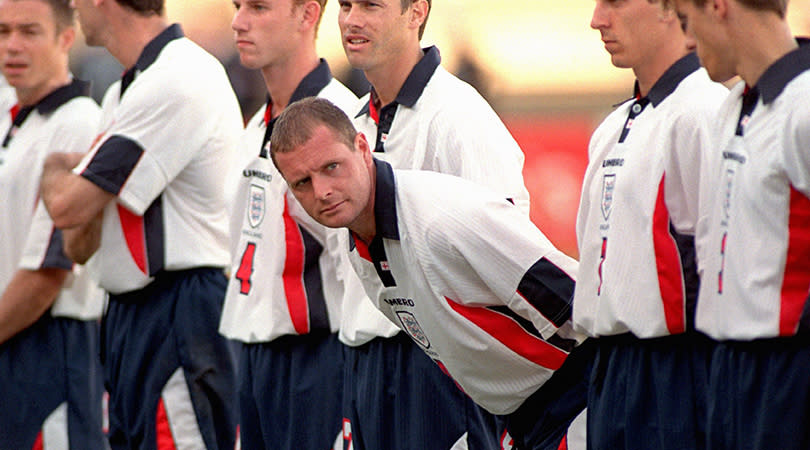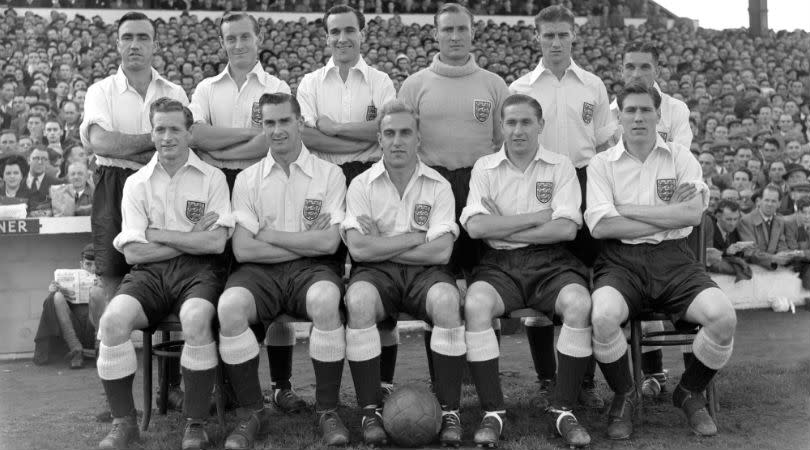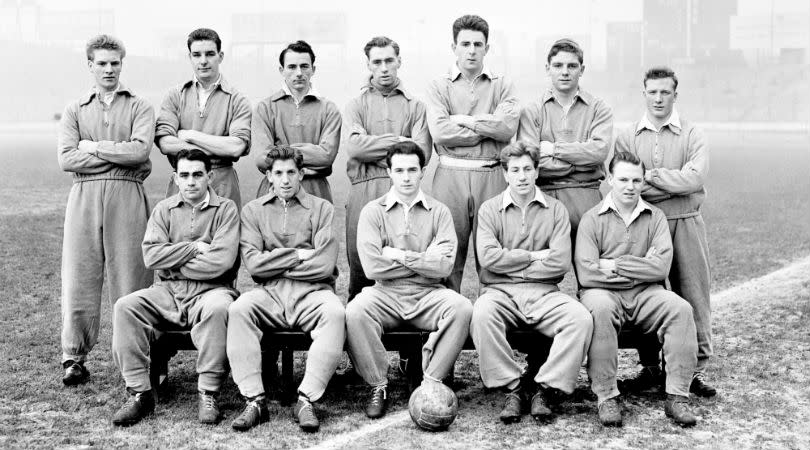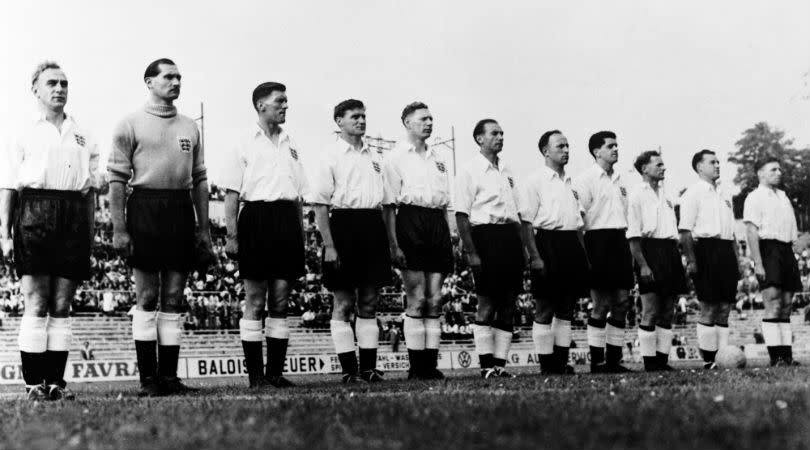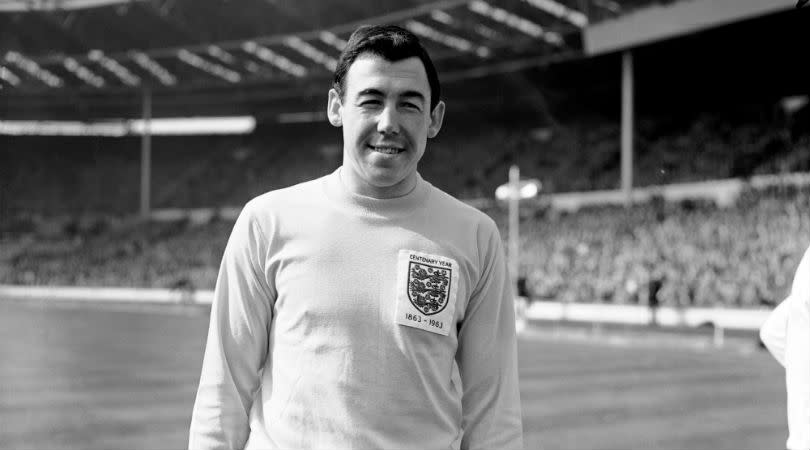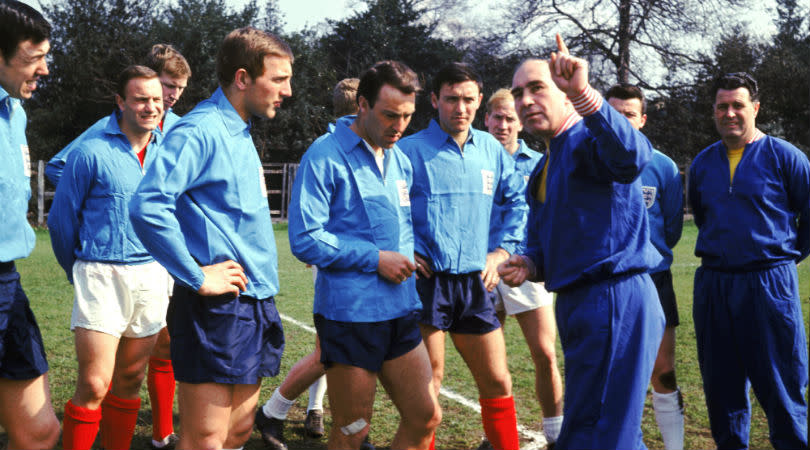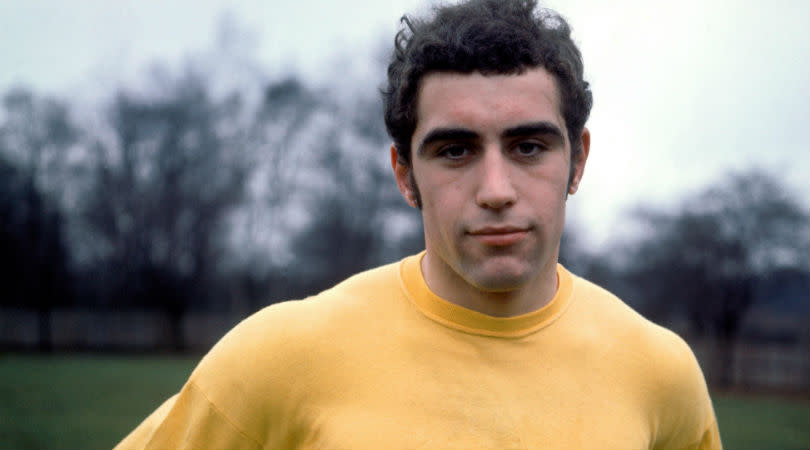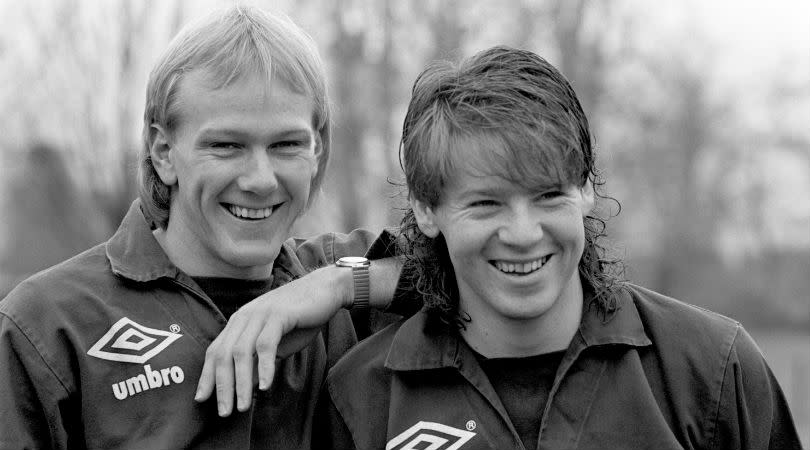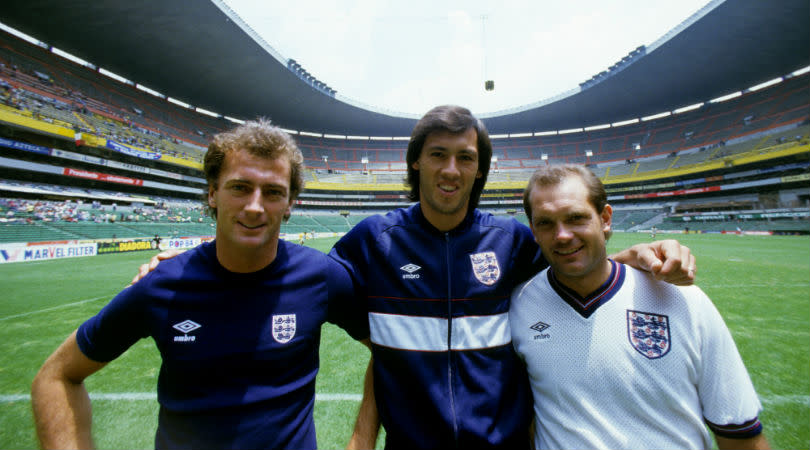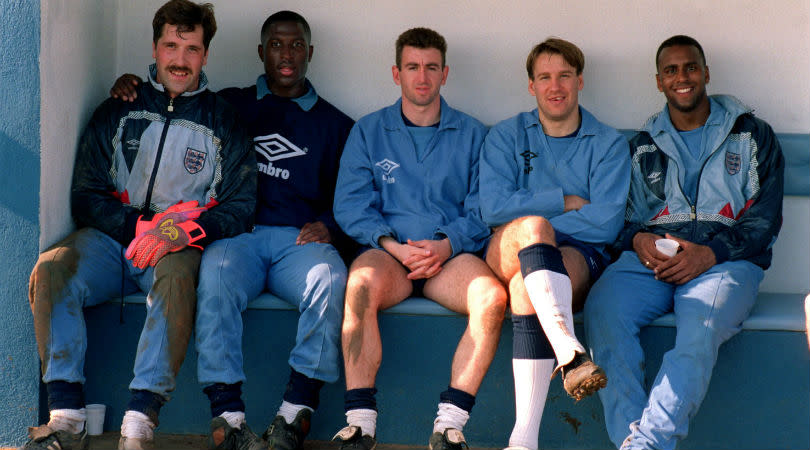England's World Cup rejects: a brief history of woe and where-are-they-nows
1950: Too cool for the old school
Len Shackleton wasn’t a shy man. His autobiography The Clown Prince of Soccer included a chapter called The Average Director’s Knowledge of Football, which was a blank page. He had moved from Newcastle to Sunderland for a British record £20,050 after falling out with the board (“I’ve no bias against Newcastle – I don’t care who beats them”). Even at the Mackems, the inside-forward would deliberately put spin on passes to centre-forward Trevor Ford to make the Welshman look foolish.

When pedantic England boss Walter Winterbottom was explaining an unopposed dry-run training session – “I want all you five forwards to run down the field, interpassing the ball, until you come to the goal, where there'll be no goalkeeper. Then put the ball into the net" – the Yorkshireman enquired from his position lying on the ground: "Which side of the net, Mr Winterbottom?"
READ MORE: Ranked! England's 23-man World Cup squad... in order of their importance this summer
READ MORE: In pictures - England’s 23-man World Cup squad
READ MORE: Gareth Southgate names England squad for World Cup in Russia
No wonder England’s crusty board of selectors didn’t like him, one declaring: “We play at Wembley, not the London Palladium.” He was on the original 28-man longlist for England’s first World Cup, in 1950, but was one of the seven who didn’t travel to Brazil. Others included the magnificently-named Sheffield Wednesday forward Redfern Froggatt.
1954: Too soon, too soon

By 1954, FIFA had ruled that World Cup competitors must name a 40-man provisional squad which would then be cut to 22, a method which remained until the mid-80s. England’s first such longlist included the Manchester United ingenue Duncan Edwards. During the year after he'd broken the top-flight record for youngest debutant (at 16 years and 185 days), Edwards became a regular in the rejuvenated Red Devils side which came to be known as the Busby Babes – even if the titular tactician didn’t like the epithet, which he felt undervalued the team’s older players.
READ MORE: 10 World Cup wildcard picks who shocked the world and shone
In the event, Edwards was a still a little too green and off the pace when the selectors watched him at Highbury, so missed the cut. He made his full debut a year later, became a regular and was tipped to replace Billy Wright as captain, but tragically he never got the chance to play at a World Cup, losing his life after the Munich disaster in early 1958.
Among other players cut from the final 1954 squad were Ron Greenwood, the Chelsea centre-half who would manage England for five years including the 1982 World Cup. His clubmate Roy Bentley was also cut, but within a year had become the only Chelsea captain to lift the league championship before the Abramovich era.
1958: Lofty ambitions thwarted

In the immediate postwar years, England weren’t short of dangerous forwards. Newcastle’s Jackie Milburn scored 10 in 13 caps, Wolves’s Dennis Wilshaw 10 in 12, Middlesbrough’s Wilf Mannion 11 in 26, Manchester United’s Tommy Taylor 16 in 19, and Blackpool’s Stan Mortensen 23 in 25. But the most prolific of them all was Nat Lofthouse.
In 1956, the Bolton centre-forward had finally overhauled the Edwardian-era Vivian Woodward to become England’s record goalscorer, coming on as sub to score his 28th and 29th goals on his 31st cap. After captaining his hometown club to victory in the 1958 FA Cup Final, Lofthouse was duly called up for the 40-man squad – but excised before the trip to Sweden. He scored his 30th and final goal that October, holding the record until Bobby Charlton overtook him in 1963.
Lofty wasn’t the only forward cut loose. Munich survivor Dennis Viollet wasn’t required, and neither was a cocky Second Division goal machine called Brian Clough. Meanwhile, West Brom’s Ronnie Allen became the first man to be cut from two England longlists.
1962: If not this time...

There are many ways to react to a knockback, but easily the best is to double down and get better. Shortly after his 21st birthday, uncapped Leicester goalkeeper Gordon Banks was called up to Walter Winterbottom’s 40-man squad for the Chile World Cup. At one point that season, keen to impress, he’d attended an England-Portugal friendly as a non-playing squad member before racing up to Leicester in time for a Cup Winners’ Cup game against Atletico Madrid.
Such enthusiasm wasn’t rewarded in the final 22 for Chile. Banks was initially named as a stay-at-home reserve, but was switched out at the last minute after a pre-tournament warm-up featured an impressive debut from a 21-year-old; some kid called Bobby Moore.
Among the others cut from the 22 were Manchester United full-back Shay Brennan, who then opted to play for the Republic of Ireland instead; Terry Paine, the Southampton winger who would win caps before Alf Ramsey discovered a new formation and went on to represent Saints a startling 808 times; and Tony Kay, a Sheffield Wednesday left-half who switched to Everton for a British record £60,000 that December – but not before betting on the Owls to lose a match, a conspiracy to defraud which earned him four months’ imprisonment. Told you there were different ways to react to adversity.
1966: I don’t want to coach you, Chelsea

Determined to come good on his promise of winning the World Cup on home soil, Alf Ramsey named his 40-man longlist two months early; the better to prepare players and their clubs. Of the 40 players, 13 came from two clubs, Liverpool (with seven) and Chelsea (six), the Stamford Bridge posse outnumbering their London rivals West Ham two-to-one.
Assembled by Tommy Docherty and augmented by Dave Sexton, the young Chelsea team was maturing nicely – top-five finishers for three successive seasons, repeating FA Cup semi-finalists, 1965 League Cup winners and 1966 Fairs Cup semi-finalists. But Ramsey cut skilful striker Peter Osgood (19), scheming midfielder Terry Venables (23), versatile forward Barry Bridges (25), bustling midfielder John Hollins (19) and stalwart defender Marvin Hinton (26).
Ramsey even called up future Chelsea record-holder Bobby Tambling (24) before also rejecting him, leaving back-up goalkeeper Peter Bonetti (24) as the Blues’ sole representative, watching on as West Ham trio Bobby Moore, Geoff Hurst and Martin Peters helped England to glory. Perhaps there’s an alternative universe in which Chelsea won the World Cup...
1970: The ins and outs of a defence

Worried by logistics for the trip to Mexico, Ramsey named a 28-man provisional squad almost laughably early on March 25. He also named a further dozen standby players who were given full medicals and inoculations in case of emergency call-up: these reserves, none used, included Everton’s Joe Royle and Colin Harvey plus Sunderland’s 1973 hero-in-waiting goalkeeper Jim Montgomery.
Among the six snipped from the squad just before the kick-off and sent home from Mexico were Peter Shilton, Brian Kidd and Liverpool winger Peter Thompson – the latter setting an unwanted record by being cut at the last moment for the third successive tournament.
Leeds utility man Paul Madeley was widely tipped to be named but wasn’t in the initial 40; when club-mate Paul Reaney was stretchered off in a league match, Alf Ramsey called up Madeley, who said he’d already made family plans for the summer and refused to go to Mexico. Ramsey therefore turned to Arsenal’s Bob McNab… then cut him from the squad as one of the six sent home.
1982: Ron manager rings the changes

Cutting players from provisional World Cup squads wasn’t an issue for England in 1974 and 1978: all Englishman were excluded because the Three Lions twice failed to reach the finals. By 1982 the decision fell to Ron Greenwood, an unassuming Lancastrian-turned-Londoner so polite that when faced with the tough goalkeeping choice between Peter Shilton and Ray Clemence, he opted to alternate them.
That’s not to say Greenwood wouldn’t make big decisions. He frequently refused to select Glenn Hoddle despite public pressure, and in 1978 made Viv Anderson England’s first non-white international: “Yellow, purple or black – if they’re good enough, I’ll pick them.”
Indeed, Anderson went to Spain 1982, and he might have been joined by Cyrille Regis had the powerful forward not torn a hamstring. Among others in Greenwood’s 40-man provisional squad were Spurs forward and future media polymath Garth Crooks, plus Manchester United’s South Africa-born blond goalkeeper Gary Bailey.
1986: Robson’s striking partnership

Greenwood resigned after the 1982 World Cup – he’d already tried to during qualification, but the players talked him around – and for Mexico '86, Bobby Robson had new rules to contend with. FIFA had dropped the requirement for a 40-man provisional squad. The genial Geordie simply named a 22-man squad with six standbys, none of whom were needed.
Among the unrequired reserves was Trevor Francis, who'd top-scored during England’s unbeaten (but unsuccessful) 1982 tournament. Francis was one of the few English experts to have done well abroad – he was just finishing a four-year spell at Sampdoria, alongside ex-Liverpool skipper Graeme Souness – but at 32 he was seen as past his best, even if it would be another eight years before he hung up his boots.
Rejecting Francis and his fellow reserve Mick Harford, Robson stuck with the striking partnership he knew: Gary Lineker playing off unlikely Milan star Mark Hateley. After two goalless games, he rolled the dice and replaced ‘Attila’ with Peter Beardsley, whose dovetailing with Lineker helped the future crisp salesman to Golden Boot glory.
1990: No Gunners, no cry

Although it’s not often remembered this way, Italia '90 came bang in the middle of two title triumphs for George Graham’s somewhat utilitarian Arsenal side. Unsurprisingly, then, Bobby Robson’s preliminary 26-man squad featured four Gunners: commanding centre-back Tony Adams, creative midfielder David Rocastle, targetman Alan Smith and goalkeeper David Seaman, who’d just joined the club from QPR.
The only other club with as many representatives in the squad was Rangers, who’d taken advantage of the post-Heysel European ban on English clubs to hoover up talent like Chris Woods, Terry Butcher, Gary Stevens and Trevor Steven. And while those four made the cut to Robson’s 22-man squad, Arsenal’s men suffered a different fate.
Dropping Adams, Robson risked Mark Wright despite the Liverpool man carrying a thigh injury. Rocastle was out despite playing in five of the six qualifiers, in which England didn’t concede a single goal; Robson preferred young bucks David Platt and Paul Gascoigne instead. And Smith was rejected for Second Division goal-bagger Steve Bull. Seaman made the 22, then a thumb injury ruled him out. George Graham presumably didn’t mind one bit.
1998: The hand of Hod points at Gazza

Glenn Hoddle knew personally the disappointment of being overlooked by England. Extravagantly talented but somewhat mistrusted, he might have won many more than his 53 caps in a country less bonded to an industrious 4-4-2 mindset.
His 30-man provisional squad for France '98 had already lost the injured Ian Wright, Jamie Redknapp and Andy Hinchcliffe when Hoddle individually told the unlucky five at England’s camp in La Manga, frequently the setting for the wrong kind of footballing theatre. Among those dismissed were Dion Dublin, Nicky Butt, Ian Walker and Phil Neville (but not his brother Gary) – but that wasn’t the story.
The fifth player cut was Paul Gascoigne, by now 31 and not an England regular but keen to replicate his Euro '96 and make good on Italia '90. Not without justification, Hoddle decided that an underused Gazza might be more hindrance than help. The Geordie didn’t see it that way, scattering the furniture and punching a lamp. He never played for England again.
2002: Midfield medical mayhem

The first Asian finals saw players clocking up the air-miles – some more than others. David Beckham’s ouchy metatarsal was part of a 23-man provisional squad named by Sven-Goran Eriksson, with Danny Murphy on standby.
Silly old Sven named his squad unnecessarily early, before the final league games, in which Keiron Dyer strained knee ligaments and Steven Gerrard did his groin – so Murphy and Trevor Sinclair joined the group in Dubai. A recovered Dyer went on to the Far East while Sinclair returned home to his pregnant wife.
Upon which, the relentlessly on-trend Murphy mashed a metatarsal in training and Sinclair repacked his suitcase to fly 6,000 miles back out east. The winger was rewarded with four finals matches, including three starts – while back in Europe, overlooked Real Madrid winger Steve McManaman kicked back and polished the two Champions League winners’ medals he’d collected in the past three seasons.
2006: Untried and untrusted

Eriksson’s 23-man squad contained four players who hadn’t started an England game: Aaron Lennon, Stewart Downing, Rob Green and Theo Walcott, the latter not only totally uncapped but yet to make a top-flight appearance. Cue gasps from the media, who excitedly predicted how many minutes the boy wonder would get in Germany.
The answer was zero, and the same applied to the luckless Rob Green, who was named in the 23 but replaced by uncapped standby Scott Carson after rupturing his groin taking a goal-kick in an England B game. (Two years later, Green – by now in the international wilderness, from which he would return to gift the USA a goal at the 2010 World Cup – wore gloves saying “England’s No.6”.)
After the chaos of 2002, Svennis named five standby players but didn’t have to recruit any except Carson. The overlooked quartet were strikers Jermain Defoe and Andrew Johnson, plus Luke Young and Nigel Reo-Coker; the latter duo both withdrew injured, and that was as close as Reo-Coker got to a full cap.
2010: If you’re old enough, you’re good enough

The Italians do like a bit of experience, and the 23-man squad that Fabio Capello eventually settled upon was England’s oldest-ever World Cup crop. After a decent first half against a spritely young Germany, they were made to look geriatric.
By then, Capello’s squad was a touch younger than intended. His 30-man provisional squad included 26-year-old Michael Dawson, who was cut but reprieved when 31-year-old Rio Ferdinand injured his knee on the first day’s training in Rustenberg.
Also cut before the tournament were Scott Parker (29), Darren Bent (26), Leighton Baines (a fresh cap at 25 – Capello preferred Stephen Warnock), Tom Huddlestone (23), Adam Johnson (22) – and, perhaps most notably, Theo Walcott. The Arsenal forward had gone to the previous World Cup aged 17 and more recently started six of the 10 qualifiers, bagging a hat-trick in Croatia, but Capello only wanted two wingers and chose Aaron Lennon and Shaun Wright-Phillips.
2014: Reconstruction time again

After failure of the Dad’s Army assembled by Capello, Roy Hodgson enthusiastically rejuvenated England with their second-youngest World Cup squad ever: only the somewhat experimental 1958 squad, with just five players over 25, had a lower average age that this crop’s 26.
Announcing his squad at a car factory – a sponsorship tie-in that launched a thousand terrible opening paragraphs – Hodgson named 23 players plus seven standbys, with John Stones particularly primed in case Phil Jones’s shoulder collapsed. It didn’t, so Stones was unneeded.
Neither was Ashley Cole, who had already cleared his pram of toys by retiring as soon as he heard he wasn’t in the provisional 23. Others unrequired run an interesting range of where-are-they-now options: John Ruddy, Jon Flanagan, Michael Carrick, Tom Cleverley, Andy Carroll and Jermain Defoe, overlooked again as he had been by Eriksson in 2006. Perhaps he can pop a comforting arm around the shoulders of Jack Wilshere, Adam Lallana, Jake Livermore and the rest.

 Yahoo Sport
Yahoo Sport 






































